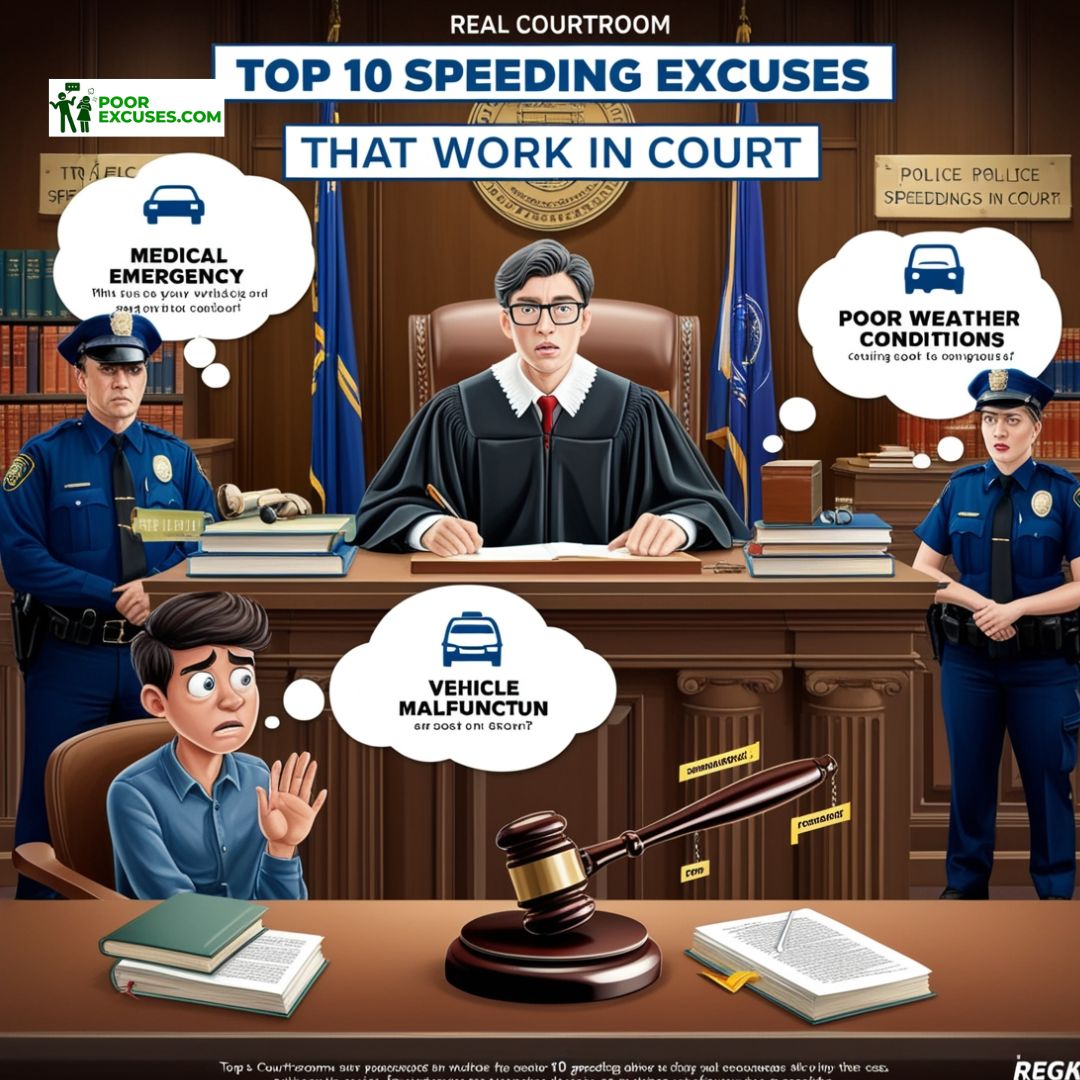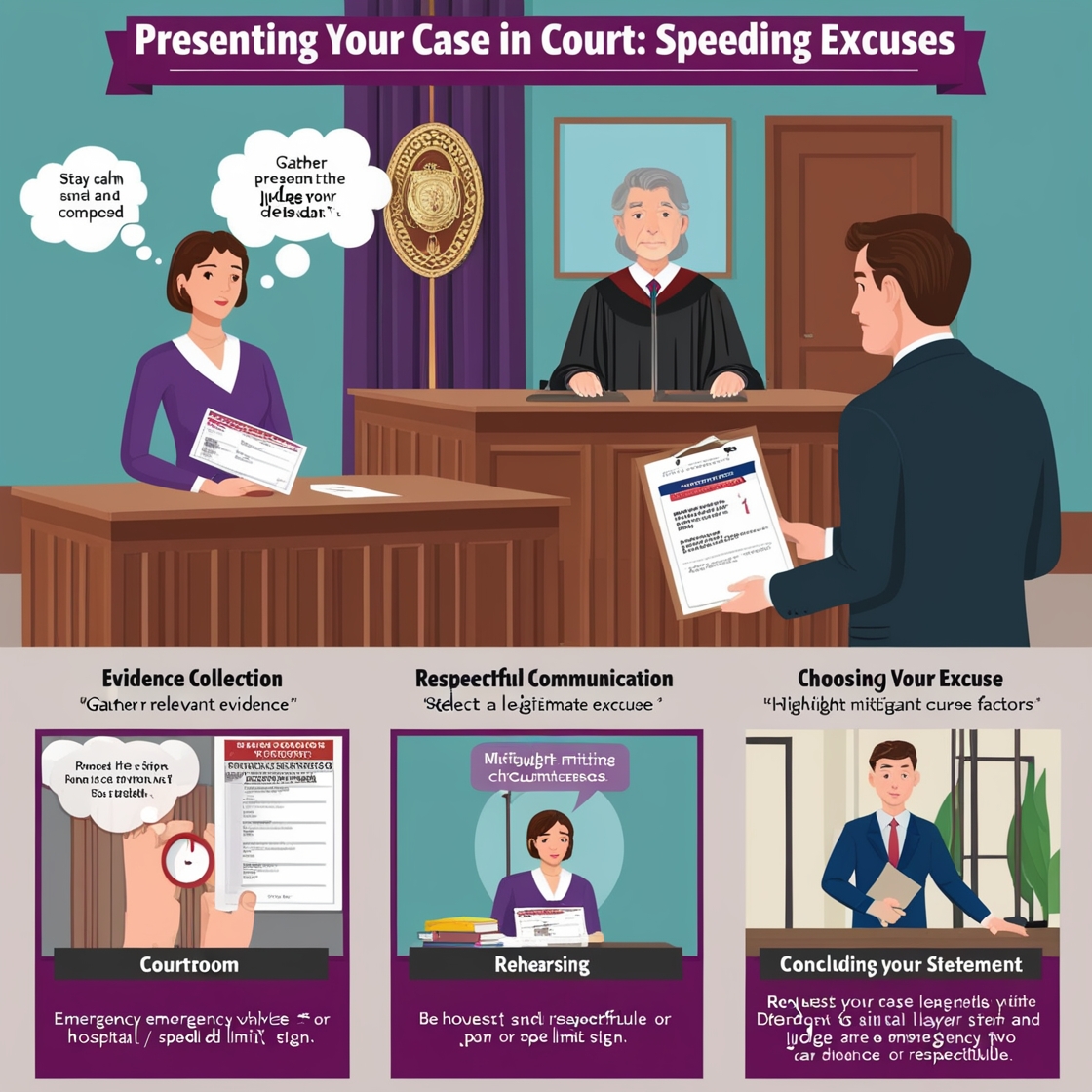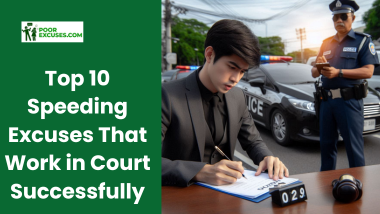What if a simple story could save you from a speeding ticket? Receiving a court letter about a speeding complaint can be unbearable. You suddenly find yourself facing the possibility of a fine and points on your record trying to figure out “the speeding excuses that work in court”
I remember getting that dreaded letter last summer, informing me that I needed to present my case in court after being pulled over for speeding.
When I first saw the letter, my heart sank. How could I effectively explain my situation to a judge? I knew the right speeding excuses could make all the difference in my defense.
As I prepared for my court date, I quickly realized that not all excuses carry the same weight. Understanding what judges want to hear became crucial.
In this article, I’ll guide you through the top 10 speeding excuses that resonate with judges. These insights will help you negotiate your traffic troubles with confidence. Stay tuned to learn how to present your case effectively when the stakes are high!
Top 10 Speeding Excuses That Work in Court

After my unexpected encounter with a speeding ticket, I was determined to confidently overcome the issue in the courtroom. I discovered that valid excuses could make all the difference. Let’s explain how she and others can effectively use these excuses to their advantage.
1. Medical Emergency Speeding Excuse
When I explained that I was racing to the hospital with my sister in distress, the urgency was clear. Judges often respond well to personal stories.
If you find yourself in a desperate situation, this is a solid excuse. Having a letter from the hospital as evidence can make your case even stronger.
2. Vehicle Malfunction as a Successful Excuse
If your car suddenly fails, that can be a great excuse. I shared that I had previously experienced brake issues. Presenting a mechanic’s report showing a recent brake failure and mph over the limit can help you prove your point.
This shows you didn’t exceed the speed limit on purpose; your vehicle just let you down.
3. Lack of Proper Signage
Missing speed limit signs can catch drivers off guard. I brought photos showing that the signs were unclear. If you didn’t know the speed limit because the signs were missing or obscured, that can be a legitimate excuse. Documenting the scene can help avoid a speeding ticket.
4. Emergency Response
In my case, I was responding to an emergency, so I gathered witnesses who could confirm my actions. Having other people back up your story makes it more believable. It shows you weren’t just speeding for fun; you had a reason. Judges appreciate this kind of honesty.
5. Mistaken Speed
Sometimes you genuinely believe you’re within the speed limit. I explained that I thought I was driving safely and provided speedometer data to back it up. This is a common excuse. If you can prove you weren’t a reckless speeder, it can sway a judge’s decision.
6. Poor Weather Conditions
Road conditions matter, especially in bad weather. I presented weather reports from the day of my ticket, showing that conditions were dangerous. If you can explain that you needed to speed to maintain control, this can be a reasonable excuse.
7. First-Time Offender Status
Having a clean driving record works in your favor. Judges often look favorably on first-time offenders, especially if they can highlight their history of safe driving. If you’ve never been stopped for speeding before, it’s a good point to mention. It shows responsibility and good driving habits.
8. Unaware of Speed Limit Changes
If you didn’t know the speed limit changed, you should explain why. In my case, I provided photos of the area to show unclear signage. This excuse can work well if you present it right. Just make sure you communicate that you’re not trying to dodge responsibility.
9. Following Another Vehicle Excuse
If you’re following the flow of traffic, you might unintentionally exceed the speed limit. I explained that I was driving in line with other cars. This shows you were behaving reasonably, not just speeding without care. It’s a relatable situation that many drivers face.
10. Urgent Personal Situation
If you’re dealing with an urgent personal matter, make sure to document it. I had texts and call logs that showed the urgency of my situation. This kind of evidence can be powerful in explaining your need to speed. It helps to prove that you had a valid reason. This is the best speeding excuses that work in court.
Each of these excuses can be successful in the right context. Judges often appreciate when drivers are personable and honest about their situations. While some people may still get pulled over for speeding, knowing these common excuses can help you sail through your case more effectively.
Understanding the Importance of Valid Excuses
When it comes to speeding tickets, not all excuses are created equal. A valid excuse can be the difference between a dismissed ticket and a hefty fine. Judges have heard countless stories, and they tend to be more lenient towards those who present compelling, sincere reasons for their speeding.
This is why understanding the nuances of what makes an excuse valid is crucial for anyone looking to challenge a ticket.
A well-articulated excuse not only demonstrates your awareness of the law but also shows that you respect the court’s time.
It signals to the judge that you take the situation seriously and are willing to be accountable for your actions. Therefore, knowing what constitutes a valid excuse can significantly impact your case.
Factors Judges Consider When Hearing Speeding Excuses

Judges weigh several factors when assessing speeding excuses.
Firstly, the context matters—emergencies are often viewed with more sympathy than simple carelessness. If your speeding was due to a legitimate emergency, the judge may be more inclined to understand your actions.
Additionally, a clean driving record can play a pivotal role. Judges appreciate drivers who have a history of responsible behavior on the road. Other considerations include the presence of evidence, such as witness statements or documentation that support your excuse.
Finally, how you present your case—your demeanor, clarity, and honesty—can significantly influence the judge’s decision. Understanding these factors can help you craft an excuse that resonates and stands a better chance of working in court.
Tips for Presenting Speeding Excuses That Work in Court
A court appearance can be nerve-wracking, especially when you’re trying to present excuses for speeding. Here are some tips to help you make your case effectively.

Staying Calm and Respectful
First and foremost, it’s crucial to remain calm and respectful throughout the process. When you’re pulled over for speeding, the officer may have a lot on their plate, and so does the judge. A calm demeanor shows that you’re taking the situation seriously.
Approach the judge respectfully, and remember that how you communicate can make a big difference. A polite attitude can sometimes influence the outcome more than the excuse itself.
Importance of Proper Documentation
Documentation is your best friend when presenting your case. Gather all relevant evidence, such as medical records, mechanic’s reports, or photos of road conditions. Having solid documentation can turn a vague excuse into a convincing argument.
When I presented my case, the hospital letter and photos helped bolster my credibility. Make sure you have everything organized and ready to share, so the judge can see the validity of your claims.
Dressing for Success in Court
First impressions matter, and how you dress can influence how the judge perceives you. Dressing appropriately shows respect for the court and can help convey that you are serious about your case. Aim for business casual attire—think clean, neat, and professional. A well-put-together appearance can enhance your persona and make the judge more receptive to your excuses.
End Note
Knowing the right excuses for speeding is just one part of the equation. Staying calm, presenting proper documentation, and dressing appropriately can significantly improve your chances of a favorable outcome. Each of these strategies plays a vital role in how your case is received.
While having effective speeding excuses that work in court, the best approach is to avoid speeding altogether. Always be aware of speed limits and road conditions to keep yourself and others safe.
Remember, driving safely not only protects you from tickets but also contributes to a safer community for everyone. If you ever find yourself in a pinch, now you know how to present your case confidently!


